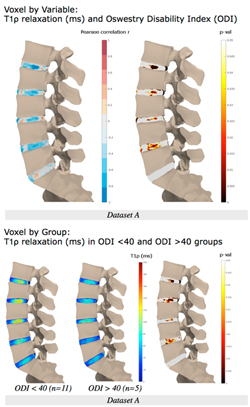Sharmila Majumdar, PhD Receives Important NIH HEAL Initiative Grant for The Back-Pain Consortium (BACPAC) Research Program to Address Chronic Low Back Pain

 According to the Centers for Disease Control and Prevention (CDC), an estimated 50 million adults in the U.S. suffered from chronic pain in 2016, and according to the Substance Abuse and Mental Health Services Administration (SAMHSA), an estimated 10.3 million people in the U.S. ages 12 and older misused opioids in 2018. As such, the National Institutes of Health (NIH) have announced the awarding of $945 million in research grants to tackle the national opioid crisis through NIH HEAL Initiative (Helping to End Addiction Long-term Initiative).
According to the Centers for Disease Control and Prevention (CDC), an estimated 50 million adults in the U.S. suffered from chronic pain in 2016, and according to the Substance Abuse and Mental Health Services Administration (SAMHSA), an estimated 10.3 million people in the U.S. ages 12 and older misused opioids in 2018. As such, the National Institutes of Health (NIH) have announced the awarding of $945 million in research grants to tackle the national opioid crisis through NIH HEAL Initiative (Helping to End Addiction Long-term Initiative).
The UC San Francisco Department of Radiology and Biomedical Imaging is pleased to announce that one such project is the Back Pain Consortium (BACPAC) Research Program of which Sharmila Majumdar, PhD, vice chair for Research, is a part of. At this time, chronic low back pain is one of the most common forms of chronic pain in adults, and current treatments are ineffective, leading to increased use of opioids. This research will also lay the foundation for NIH funded research at the newly established Center for Intelligent Imaging, using artificial intelligence fueled algorithms for fast image acquisition, data analysis, quantitative sensory assessments, brain imaging, and biomechanical evaluation of the spine.
 The BACPAC Program is a "translational, patient-centered effort to address the need for effective and personalized therapies for chronic low back pain." The goal of the program is to develop an integrated model of chronic back pain. First, they plan to use genetic information to characterize those with lower back pain and understand mechanisms underlying the condition. Then, they plan on identifying novel pathways and targets for intervention for the development of new therapeutic options. Next, they plan on developing, testing and refining precise diagnostic and treatment algorithms in clinical trials using new interventions and/or combination therapies so health care providers can tailor therapies to patients. This will be followed by data from translational research and Phase 2 clinical trials to deliver an integrated model of back pain. The BACPAC program will also collaborate with the Early Phase Pain Investigation Clinical Network (EPPIC-Net), a program that "seeks to enhance the treatment of acute and chronic pain and reduce reliance on opioids by accelerating early-phase clinical trials of non-addictive treatments for pain."
The BACPAC Program is a "translational, patient-centered effort to address the need for effective and personalized therapies for chronic low back pain." The goal of the program is to develop an integrated model of chronic back pain. First, they plan to use genetic information to characterize those with lower back pain and understand mechanisms underlying the condition. Then, they plan on identifying novel pathways and targets for intervention for the development of new therapeutic options. Next, they plan on developing, testing and refining precise diagnostic and treatment algorithms in clinical trials using new interventions and/or combination therapies so health care providers can tailor therapies to patients. This will be followed by data from translational research and Phase 2 clinical trials to deliver an integrated model of back pain. The BACPAC program will also collaborate with the Early Phase Pain Investigation Clinical Network (EPPIC-Net), a program that "seeks to enhance the treatment of acute and chronic pain and reduce reliance on opioids by accelerating early-phase clinical trials of non-addictive treatments for pain."
The overall goal of this translational research is to be able to apply these methodologies and improvements for clinical use. The NIH's HEAL Initiative is bringing together expertise from nearly every NIH institute and center to approach the opioid crisis from every angle and discipline.
